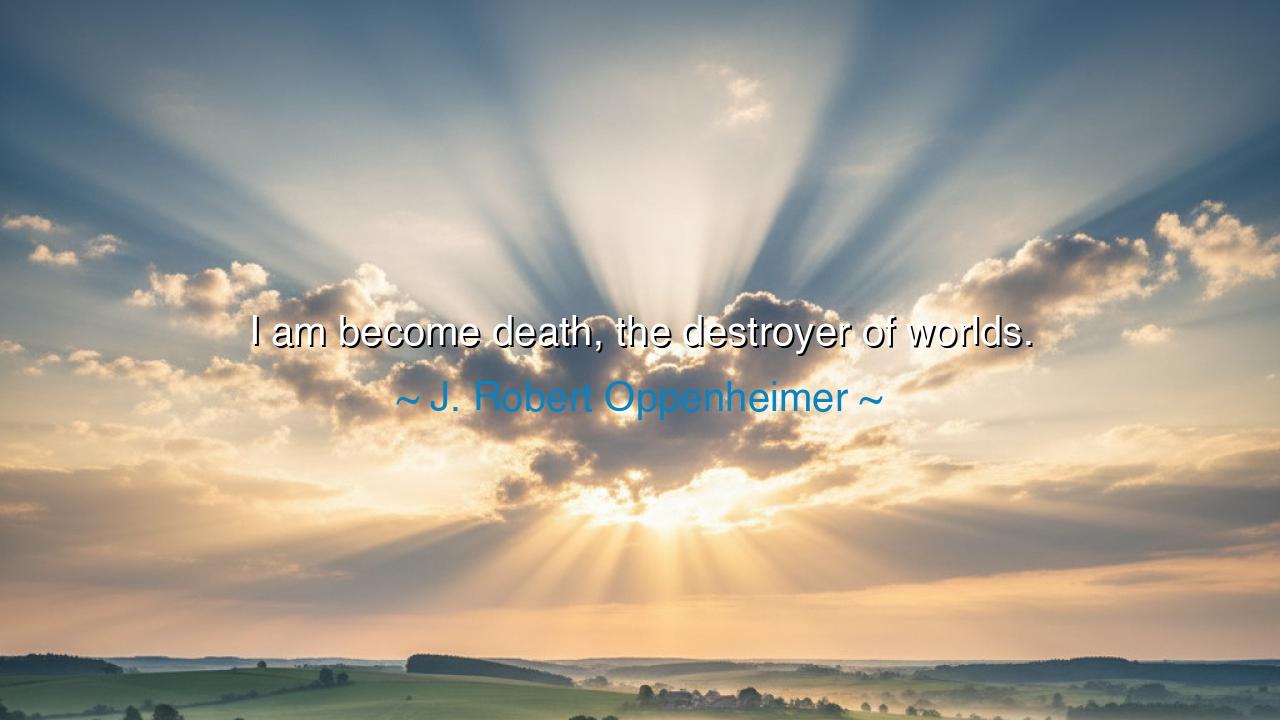
I am become death, the destroyer of worlds.






“I am become death, the destroyer of worlds.” — J. Robert Oppenheimer
In this chilling and immortal utterance, J. Robert Oppenheimer, the father of the atomic bomb, gave voice to the burden of a man who had touched the power of the gods and felt the weight of creation and destruction in his soul. When he witnessed the first detonation of the atomic bomb on July 16, 1945, in the desert of New Mexico, he recalled a verse from the Bhagavad Gita, the sacred Hindu scripture: “Now I am become Death, the destroyer of worlds.” These words, spoken by the divine Krishna in the text, symbolize the unveiling of cosmic power — a power that transcends human comprehension. But in Oppenheimer’s mouth, they became a lament — the cry of a man who realized that humanity had crossed a threshold it could never retreat from.
The origin of this quote reaches back thousands of years to ancient India. In the Bhagavad Gita, the warrior prince Arjuna stands trembling upon the battlefield of Kurukshetra, torn between his duty and his compassion, unwilling to fight against his own kin. To guide him, the god Krishna reveals his divine form — vast, infinite, terrible, and radiant — and declares: “I am Time (or Death), the destroyer of worlds.” In this revelation, Krishna shows that destruction and creation are not opposites, but part of the eternal cycle of existence. Death, in the cosmic sense, is not evil; it is transformation — the passing away of one form to make way for another. But for Oppenheimer, standing before the blinding light of his own creation, the line no longer spoke of divine balance. It spoke of mankind’s apocalyptic power, of knowledge unmoored from wisdom.
Oppenheimer’s moment was both triumph and tragedy. He and his team of scientists at the Manhattan Project had achieved what no one before them could — they had harnessed the energy hidden in the atom, the same energy that fuels the stars. Yet as the mushroom cloud rose into the heavens, he felt the gravity of what he had unleashed. That fiery dawn marked the beginning of a new age, where man held in his hand the power to end all life. “We knew the world would not be the same,” he later said. “A few people laughed, a few people cried. Most people were silent.” The silence he described was not ignorance; it was awe — the silence of those who sense that a boundary of the sacred has been broken.
The ancient philosophers would have recognized Oppenheimer’s torment. They taught that knowledge without virtue leads to ruin, and that those who wield power without balance summon their own destruction. The Greek myth of Prometheus tells of a similar fate — the Titan who stole fire from the gods to give to mankind, only to be punished for his transgression. Fire gave light and life, but it also gave war and ruin. In Oppenheimer’s hands, atomic fire repeated the same pattern. His words, like Prometheus’ suffering, are a warning that the gifts of knowledge demand humility, lest they consume those who possess them.
And yet, within Oppenheimer’s sorrow lies a deeper truth about the human condition. To create is to destroy; to advance is to risk; to know is to awaken forces that can both heal and harm. The same discovery that birthed the bomb has also powered hospitals, spacecraft, and energy for civilizations. The dual nature of knowledge is the eternal dilemma of mankind — every invention, every discovery, carries within it the shadow of its misuse. Oppenheimer’s quote is not only a confession of guilt, but also a mirror held before us all, reminding us that power without conscience turns creation into catastrophe.
In the decades that followed, Oppenheimer sought to reconcile what he had done. He became an advocate for international control of nuclear weapons, warning of the peril of an arms race. But the words he spoke that day would follow him like a ghost. They remind us that even the most brilliant mind must answer to the moral law. His story stands as a parable of modern hubris — that moment when humanity, reaching for godlike knowledge, must reckon with the divine responsibility it carries. The destroyer of worlds is not a single man, but all of humanity when it forgets its soul.
Lesson:
From the words of J. Robert Oppenheimer, we learn that knowledge is sacred, and those who hold it must walk with reverence. To build, to discover, to create — these are divine acts, but they must be bound by wisdom and compassion. Let no one seek mastery without mindfulness, for the same hand that shapes the world may also break it. We must be caretakers of the fire we wield, not slaves to it. Use your intellect to enlighten, not to dominate; your strength to protect, not to destroy. For as long as mankind remembers that it is both creator and guardian — and not god — the light of knowledge will remain a gift, not a curse. And the words “I am become death” will never again echo through the hearts of those who stand before the fire of their own making.






AAdministratorAdministrator
Welcome, honored guests. Please leave a comment, we will respond soon